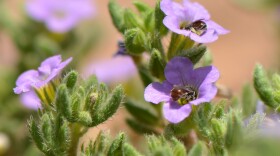According to the U.S. Department of Agriculture, a third of our diet comes from crops that need pollinators like bees, butterflies and moths.
But, the department also said that the population of these species has been in decline. This puts some of the crops we and others animals eat in danger.
That drove Nicole Brown to co-create Bee City Wichita, an organization that’s dedicated to conserving and promoting local pollination.
“We wanted to focus on pollinators because so many other people do not focus on them,” she said. “They are very much underappreciated and overlooked.”
Bee City Wichita is a part of the Bee City USA network. The network is a nonprofit run through the Xerces Society, which focuses on the protection of invertebrates.
Bee City USA designates cities and college campuses based on their efforts to conserve pollinators and their interest in joining the network.
Laura Rost is the national coordinator for the organization.
“I want communities to dictate what works for them,” Rost said. “I want to make sure the program continues to feel integrated into the cities and campuses that choose to participate.”

There are currently 186 Bee City USA affiliates. Wichita is the first city in Kansas to be recognized as a member.
Brown co-founded Bee City Wichita alongside her close friend, Rachel Roth. The pair began contacting members of the community to join their efforts. Soon after, they formed a team of nature experts and enthusiasts.
Seth Macy is one of the members of the group. He’s also a landscaper at Pawnee Prairie Park and built the team’s first native garden.
Located near the now-closed nature center, the garden houses 40 native plants like milkweed, sunflowers and even black cherries.
Macy said he knew the climate was changing and the best way he could help was by creating the garden.
“It’s just very rewarding, once you plant something and you see the wildlife you planted for using it?” Macy said. “There’s no better feeling than that.”
The National Wildlife Federation reported that climate change’s effects like higher temperatures and irregular rainfall affects native species negatively.
Invasive non-native species like garlic mustard could take over affected areas.
“We like [native plants] because our insects have evolved alongside them,” Macy said. “A lot of pollinators will lay eggs in those plants, they won’t lay eggs on [invasive] plants.”
Besides using native plants as breeding grounds, pollinators also look for those that will give them food to eat like nectar.
Dexter Mardis is an ecologist with WSU who’s working alongside Bee City Wichita. He said that when a pollinator, like a bee, lands on these flowers to feed, it accidentally catches the flower’s pollen on the hair of its legs.
“They end up just becoming these giant mixing bowls of pollen moving from flower to flower,” he said. “Helping to spread genetic diversity and to make sure that the female flowers of the plants are fertilized.”

If pollination were to stop, the USDA said more than 150 national food crops would be affected, including almost all fruits and grains.
“We have to care about these things because they do form the basis of our food chain,” Brown said. “Without these plants, without these insects, everything would collapse”
Pollinators don’t just function as a way to pollinate the crops we eat, they themselves are also a source of nutrition for other animals.
“Birds, bats and frogs would fall silent quickly,” Mardis said. “Maybe not totally but certainly they would be drastically reduced. They would starve, babies wouldn’t grow up and it wouldn’t take very long for those animals to disappear.”
The group said protecting bees and other pollinators is a city-wide effort. It’s working on a second native garden in Central Riverside Park.
While the group said that native gardens are a great way to promote more pollination. Brown said that everyone can do their part with just one potted plant.
“If you live in an apartment and all you can do is put a container out on your balcony or out on your front step, that’s amazing,” Brown said. “That’s a huge step forward.”
The group is currently planning a pollination awareness event for September, and it’s also creating a guide for people to easily create their own native gardens at home.
As Mardis said, “The inverse of death by a thousand cuts is life by a thousand flowers.”
Copyright 2023 KMUW | NPR for Wichita. To see more, visit KMUW | NPR for Wichita. 9(MDA4OTAxNzAzMDEzMjc0MTc2MzA5ZDZlMw004))







